Quick Summary:
The fast-paced development trends demand high-quality output with limited post-production errors. To achieve this goal, DevOps tools and technologies have gained significant traction among businesses for building more cohesive development cycles. Therefore, this blog post has a curated and categorized list of the Best DevOps Tools in 2024 that you can use based on your project requirements.
Table of Contents
What is DevOps Tools?
The DevOps tools are the umbrella that facilitates the entire software development lifecycle. It includes platforms, tools, servers, and applications within a new SLDC model called DevOps.
Simply put, considering What is Dev Ops? Well! DevOps is an integrated workflow of software “development” (Dev) and “operations” (Ops.) It follows a basic seven-phase process called the DevOps lifecycle. The development teams and operational engineers have widely adopted this process from the start to the end of their project.
The best DevOps tools possess everything from code reviews to version control, deployment, as well as monitoring. They facilitate transparency, collaboration, and automation and remain at the root of your value stream. These top DevOps tools allow for effective sharing, information exchange, and technical know-how among the stakeholders, whether it is development, operations, security, or business teams, for efficient product output. So, without any further delay, let us jump to these tools for DevOps that we have picked up based on our experience for your next project.
Best DevOps Tools Categorized Based on Their Usage
DevOps follows a more liberal approach focusing on emerging technologies like AI/ML, IoT, and cloud computing. Several top DevOps tools help build, version control, configuration management, project management, incident management, and much more based on your needs and requirements. Below is a list of tools in DevOps, categorized based on their respective usages:
DevOps Continuous Integration and Continuous Development (CI/CD) Tools
CI/CD tools are essential for efficient and automated delivery in DevOps. They enhance workflows, enable automation, and create robust pipelines. You can integrate these tools with continuous testing software. Here are a few renowned DevOps CI/CD tools:
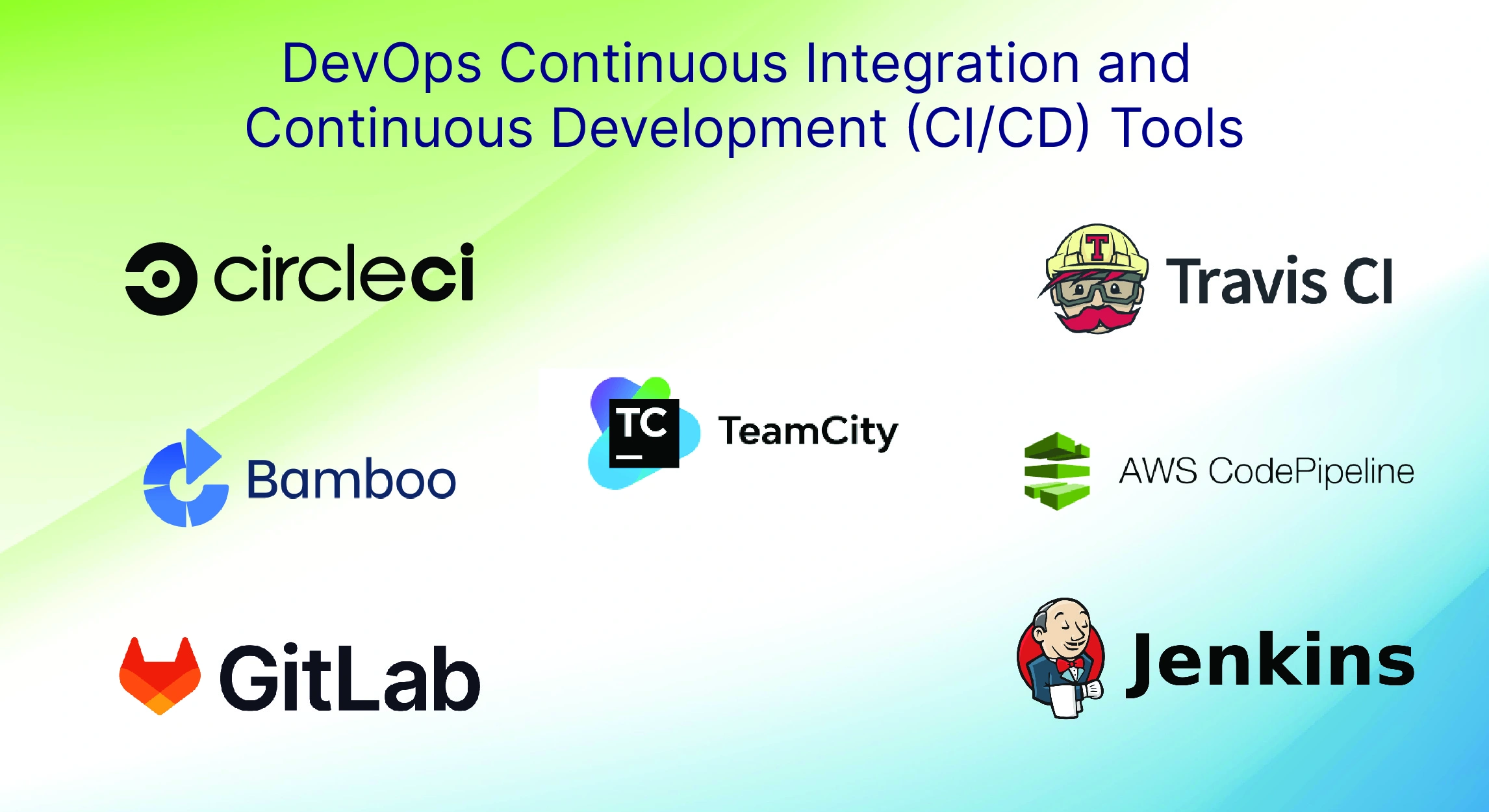
1. Jenkins
Often, when talking about DevOps, the question that most arise is, ‘What is Jenkins?’ Well! Jenkins is a renowned open-source CI/CD tool for DevOps that supports continuous integration, deployment, and automation. It offers extensive options for internal and external plugins, enabling you to extend its functionality further. Also, you can quickly deploy it on cloud-based platforms.
Features of Jenkins:
⭐ Extensive plugin ecosystem
⭐ Simple installation and configuration
⭐ Open source in nature
⭐ Extensive extensibility
⭐ Server-based security
GitHub: 21.1k Stars and 8.2k Forks
2. CircleCI
CircleCI is DevOps tool that provides automated workflows for building, testing, and deploying code changes pushed to a repository. These pipelines are defined in a version-controllable configuration file, ensuring faster builds and allowing easy monitoring of logs and test results.
Features of CircleCI:
⭐ Build management for any project size
⭐ SSH troubleshooting for build issues
⭐ Parallel task execution in config.yml
⭐ Data reuse with caching configuration
⭐ Self-hosted runners for platform-specific support
GitHub: 732 Stars and 1.4k Forks
3. Bamboo
Bamboo is a commercial Continuous Integration & Continuous Deployment (CI/CD) tool that automates the delivery pipeline, integrating well with Git and Mercurial branching workflows. It offers time-saving pre-built features and eliminates manual configuration like Jenkins. With Bamboo, you can create stage-wise build plans, set triggers, and allocate resources for critical builds and deployments.
Features of Bamboo:
⭐ Time-saving configuration
⭐ Intuitive UI with tooltips
⭐ Parallel automated tests for efficient bug finding
⭐ Auto-completion
⭐ Enhanced Jira and Bitbucket integration
GitHub: 1.9k Stars and 342 Forks
4. TeamCity
JetBrains’ TeamCity is a flexible and comprehensive CI/CD tool that supports various development practices and workflows. With features like code coverage, analysis, and duplication avoidance, TeamCity supports efficient development through its architecture and settings. It also ensures archive and backup storage of modifications, errors, and builds for future reference.
Features of TeamCity:
⭐ VCS interoperability
⭐ Code quality tracking
⭐ Extensibility and customization
⭐ System maintenance
⭐ User management
GitHub: 133 Stars and 76 Forks
Supercharge your business and transform your DevOps foundation
Partner with the experts, Hire DevOps Engineer from Bacancy and unleash optimal performance to achieve exceptional results.
5. Travis CI
Travis CI is another free and open-source CI/CD DevOps tool in Ruby that easily integrates with GitHub. It automatically builds and tests software based on code commits and changes pushed to the GitHub repository, ensuring a smooth development workflow for your team.
Features of Travis CI:
⭐ Simple cloud service deployment
⭐ Enterprise-level access control
⭐ On-demand scaling
⭐ Artifact creation and code quality evaluation
⭐ Detects code modifications
GitHub: 8.4k Stars and 833 Forks
6. GitLab
GitLab CI/CD helps to reduce technical debt significantly by streamlining software development with automation, rapid delivery, and comprehensive features. From planning to SCM, delivery to monitoring and security, GitLab covers it all. It simplifies code repository management, enables efficient building and testing, and facilitates quick application deployment. With easy user scalability, productivity is boosted.
Features of GitLab:
⭐ Code and project data management with branching tools
⭐ Inbuilt automated security
⭐ Code quality and vulnerability management
⭐ Issue tracking and code review
⭐ Open-source nature
GitHub: 23.3k Stars and 5.7k Forks
7. AWS CodePipeline
AWS CodePipeline, an Amazon commercial DevOps CI/CD tool, streamlines product development and delivery. As part of the comprehensive AWS suite of DevOps tools, it seamlessly integrates with various Amazon services, simplifying cloud pipeline setup. While CodePipeline offers numerous features, it may require familiarity with AWS services for optimal utilization.
Features of AWS CodePipeline:
⭐ Pre-built and custom plugins
⭐ Declarative templates
⭐ Integrations with AWS
⭐ Access control
⭐ Workflow modeling
DevOps Source Code Management Tools (SCM)
In DevOps, source code is the foundation of software development that covers creation, storage, analysis, and review activities. Efficient source code management brings you the power of version control, issue tracking, code review, and packaging; ultimately enabling streamlined pipelines. When selecting DevOps source code management tools, making the right choice empowers teams to achieve effective code management, foster seamless collaboration, and ensure project success. Consider the following top DevOps Source Code Management Tools for your next project:
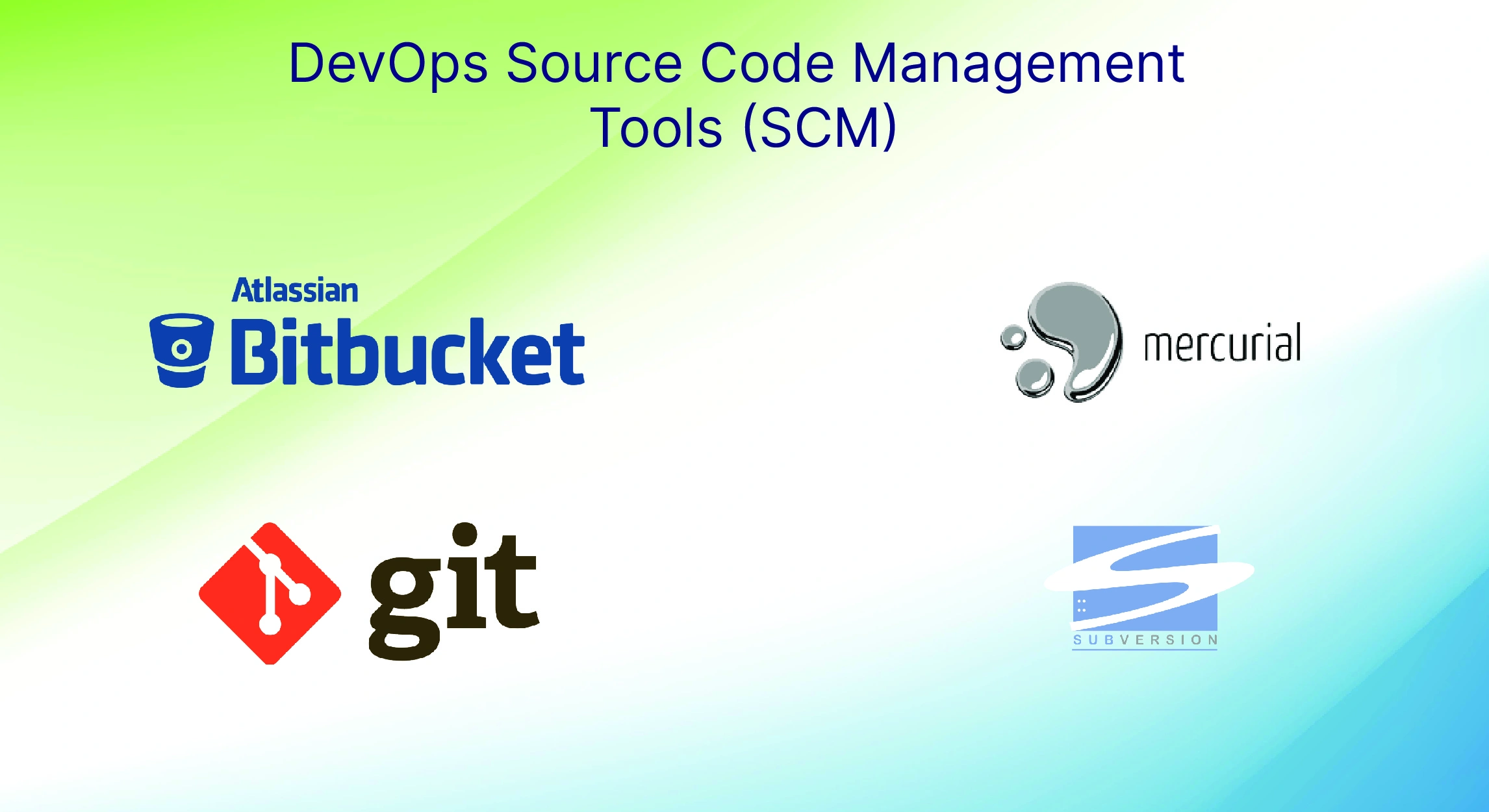
8. Bitbucket
Bitbucket, a robust cloud-based service, enables developers to store, manage, and track code changes effectively. With its powerful Git repository hosting, Bitbucket stands out as a top-tier source code management and version control solution. It offers free usage for up to five users and supports multiple private and public repositories, making it a reliable choice for teams of all sizes.
Features of Bitbucket:
⭐ Seamless integration with Jira
⭐ Cross-team collaboration
⭐ Extensive code review capabilities
⭐ Automated deployments and workflows
⭐ Strong security and compliance measures
9. Git
Git is an open-source distributed SCM tool that provides efficient version control for projects of all sizes. It is widely recognized as a critical version-control tool in DevOps that ensures speed, efficiency, and effective collaboration for software development projects. It facilitates seamless coordination among your development team and allows easy work progress tracking. With Git, you and your team can collaborate in a shared workspace, saving different source code versions and quickly reverting to previous versions when necessary. Additionally, Git simplifies code refactoring by offering seamless access to legacy and next-gen code repositories.
Features of Git:
⭐ Distributed development
⭐ Pull request support
⭐ Faster release cycles
⭐ Extensive scalability
⭐ Security and speed
GitHub: 46.8k Stars and 25.3k Forks
10. Mercurial
Mercurial is a highly favored choice among developers due to its open-source nature, distributed revision control capabilities, and user-friendly structure. Its simple syntax and intuitive command-line interface make it an ideal option for novice developers. Mercurial excels in handling large codebases, ensuring scalability and efficiency.
Features of Mercurial:
⭐ Convenient extensibility
⭐ Simplicity and speed
⭐ Platform independence
⭐ Distributed architecture
⭐ Ideal for large projects
11. Subversion (Apache SVN)
Subversion, also known as Apache SVN, is a reliable centralized version control system and a valuable SCM DevOps tool for managing and tracking changes. It is particularly favored in enterprise environments for its robust security and permission features. While Subversion may be slower than Git and Mercurial, it compensates with its ease of use and enhanced reliability. It is a trusted choice for corporate environments where security and permissions are paramount.
Features of Subversion:
⭐ Atomic commits support
⭐ Complete version history retention
⭐ File locking for non-mergeable files
⭐ Symbolic link versioning
⭐ Internationalized program messages
DevOps Configuration Management Tools
DevOps configuration management comes into play when an automated platform takes over the manual configuration processes, including monitoring, designing, and managing. DevOps tools in this area help you to track the application and service status, identify issues, prioritize actions, and validate completion. Here are the top tools for DevOps for configuration management:
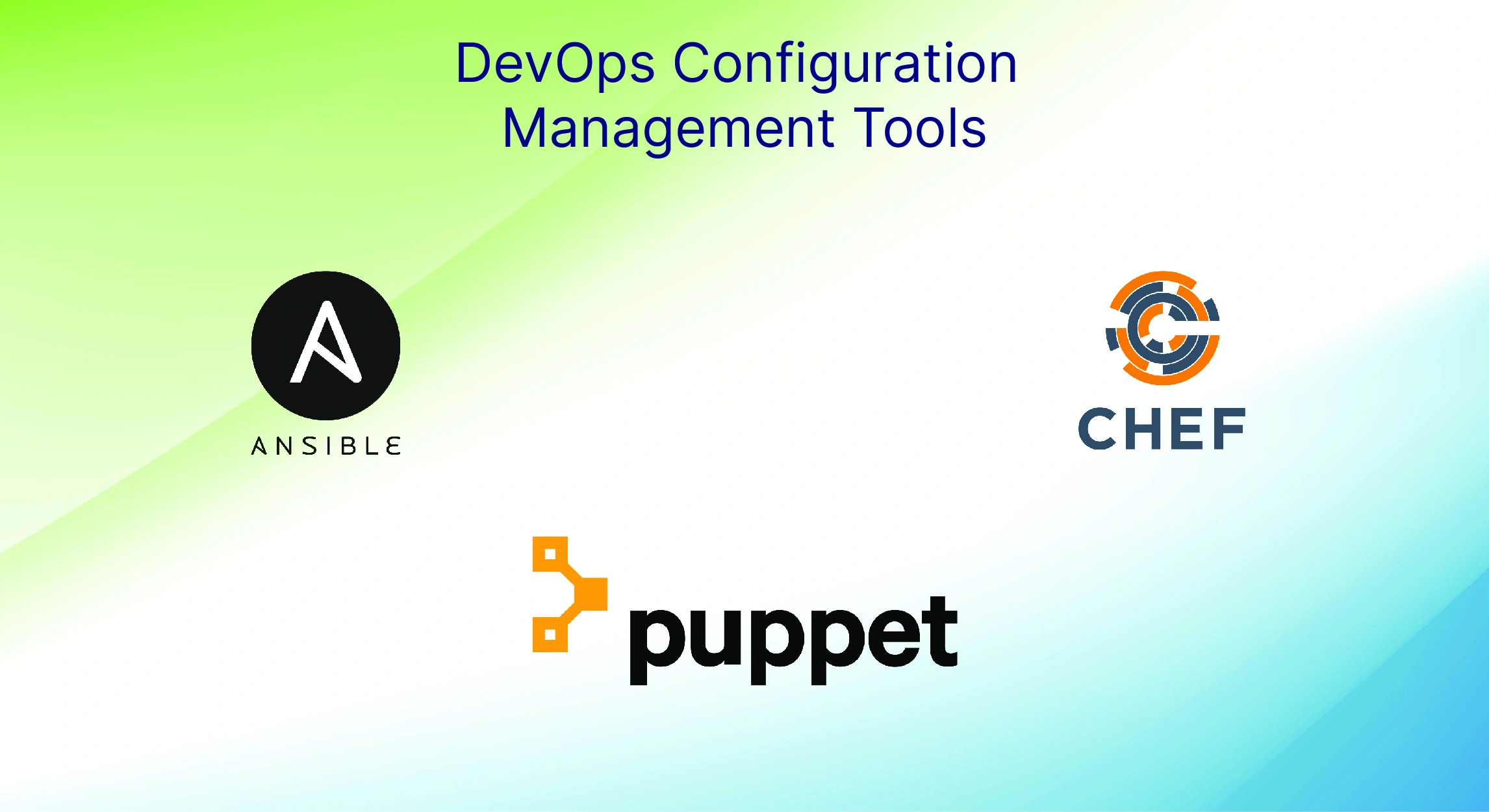
12. Puppet
Puppet is an open-source DevOps configuration management tool that allows for automating server configuration. It uses declarative programming for system configuration, deployments, as well as server management. The Puppet platform consolidates multiple packages to simplify managing, storing, and running Puppet code.
Features of Puppet:
⭐ Defines and enforces infrastructure
⭐ Inspects and reports on running packages across infrastructure
⭐ Automates software delivery
⭐ Enables swift and efficient project delivery
⭐ Provides real-time context-aware reporting
13. Chef
Chef is an open-source framework that uses a master-agent model, offering Infrastructure as Code or IaC capabilities to automate infrastructure configuration. It ensures speed, scalability, and consistency. With its support for multi-platform environments, including cloud platforms, Chef is highly regarded as one of the most popular tools for DevOps, following closely after Puppet.
Features of Chef:
⭐ Multi-cloud management
⭐ High availability maintenance
⭐ Ruby-based domain-specific language (DSL) creation
⭐ Mechanisms for retrieving current machine state
14. Ansible
Ansible, a popular DevOps configuration management tool, excels in automating repetitive tasks and solving similar problems efficiently. Providing a streamlined solution saves time and energy and enhances productivity.
Features of Ansible:
⭐ Easy-to-use open-source application deployment
⭐ Simplifies software development process
⭐ Eliminates repetitive tasks
⭐ Manages complex deployments and speeds up development
⭐ Leverages Infrastructure as Code (IaC) architecture
Containerization/Container Orchestration DevOps Tools
Container orchestration DevOps tools are the ones that help automate container deployment, management, scaling, and networking. It is precisely beneficial for organizations dealing with large numbers of containers. Container orchestration focuses on the operational efforts required to run containerized workloads and services. It encompasses various tasks and software team management, including provisioning, deployment, scaling, networking, and load balancing. Here are the top DevOps tools for containerization:
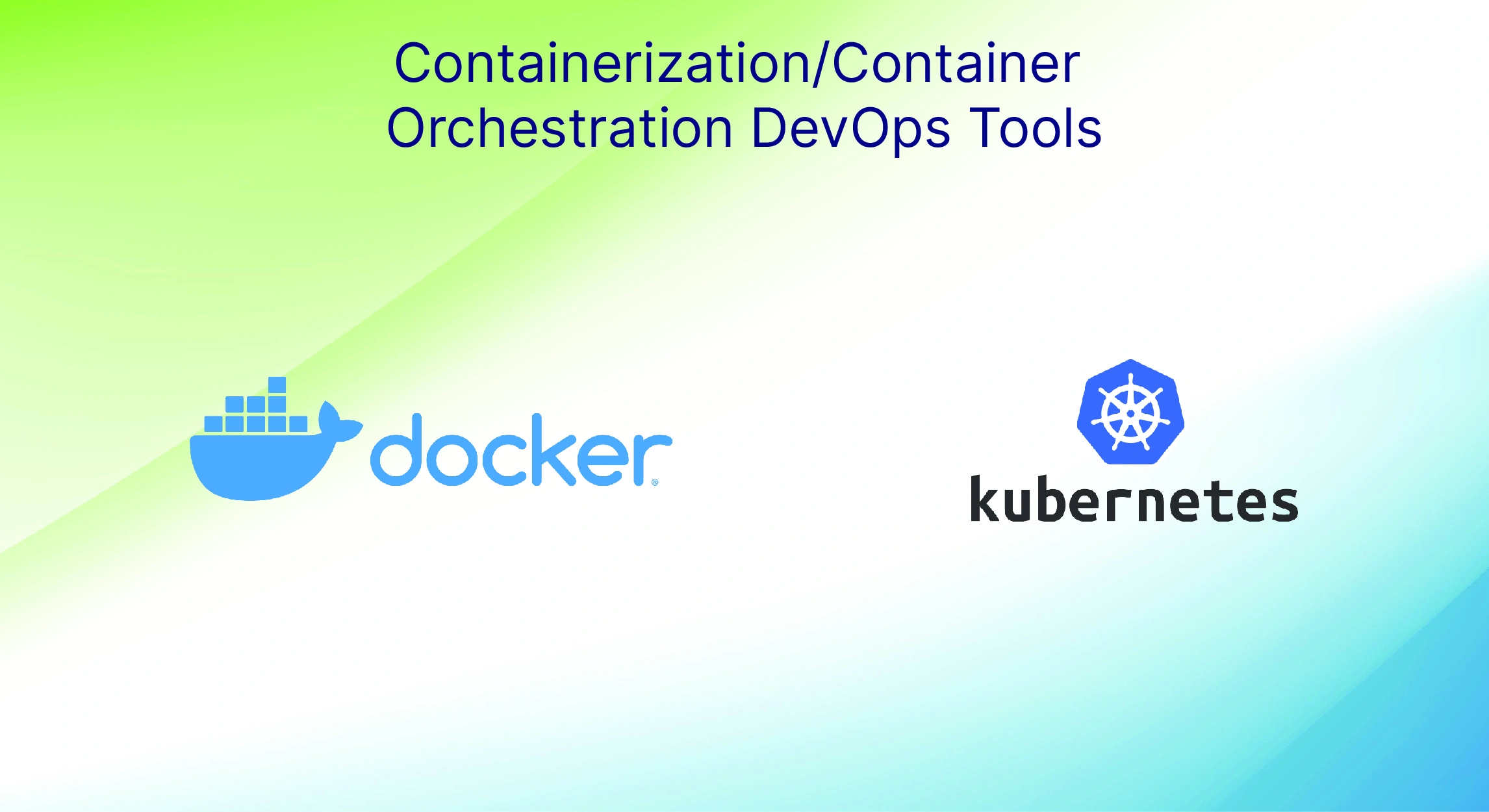
15. Docker
Docker is an open-source, powerful DevOps tool for container orchestration that enables building, shipping, and running distributed applications across multiple systems. It automates containerized applications’ development, deployment, and management on single nodes. Docker integrates seamlessly with cloud services such as AWS, GCP, and Azure.
Features of Docker:
⭐ Increased productivity
⭐ Built-in secret storage for swarm
⭐ Isolated container environment for running applications
⭐ Swift and accessible system configuration
⭐ Cloud and performance monitoring capabilities
⭐ Enhanced security through app isolation in containers
16. Kubernetes
Kubernetes, also known as K8s, is another open-source container orchestration tool developed by Google. It excels in continuous deployment, auto-scaling, fault tolerance, and load balancing within container clusters. As one of the top DevOps tools for containerization, Kubernetes is particularly valuable for applications comprised of multiple containers. With Kubernetes, you can effortlessly create and assign Docker containers based on demand and scaling requirements.
Features of Kubernetes:
⭐ Automated rollouts and rollbacks
⭐ Service traffic routing based on cluster topology
⭐ Management of batch CI and workloads
⭐ IPv6 and IPv4 address allocation to services and pods
Get to know the best Container Orchestration tool between Kubernetes and Docker Swarm
Build Tools in DevOps
Building tools in DevOps automate transforming source code into executable applications. This involves compiling, linking, and packaging the code. Build automation streamlines various tasks performed by software developers daily. Here are the top DevOps build tools to consider for your next web application development project:
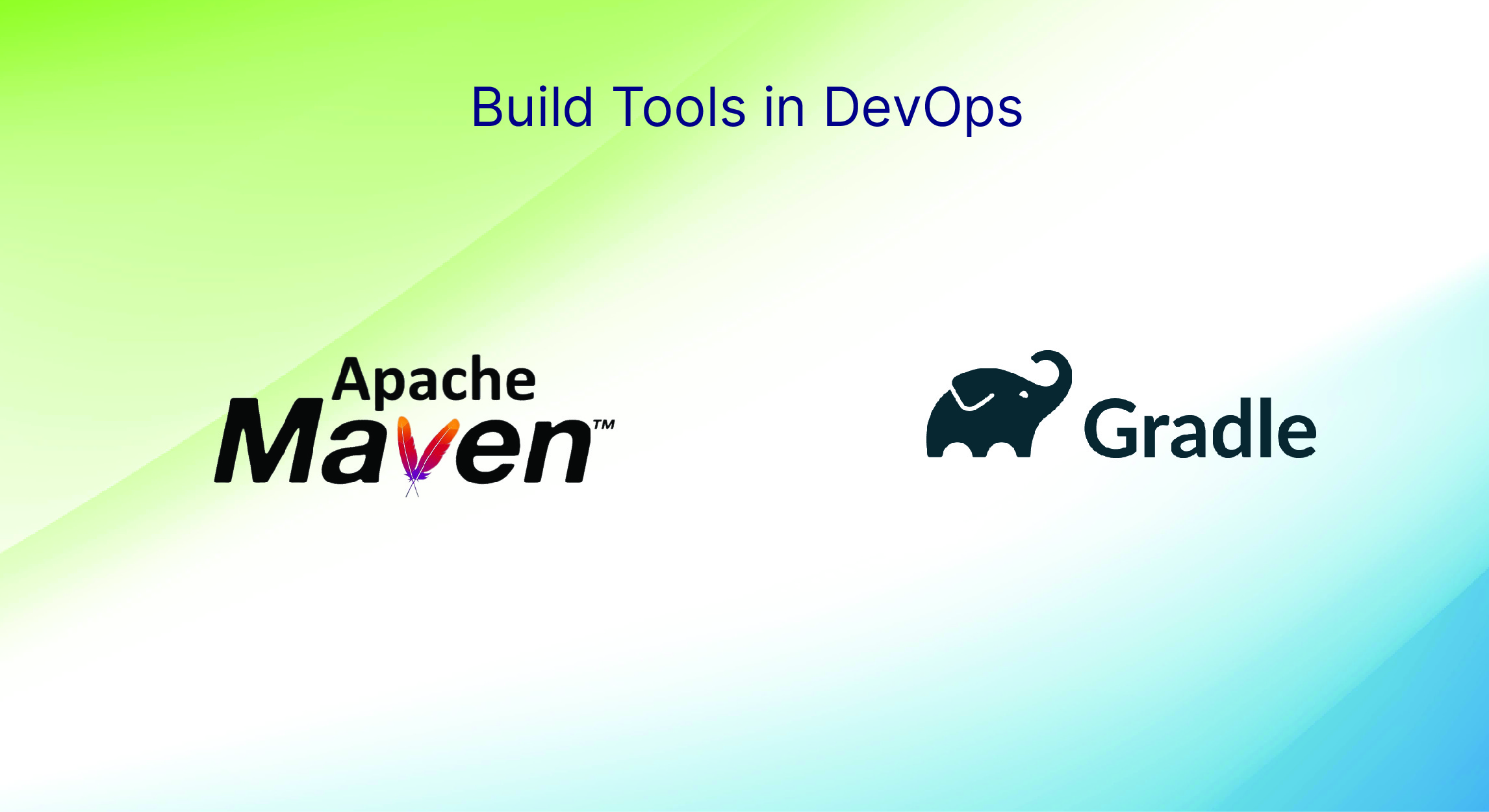
17. Apache Maven
Maven, developed by the Apache team, is a widely recognized open-source build tool used for efficient project management, building, publishing, and deploying multiple projects. Maven offers numerous benefits to its users, including simplified automation of the build and monitoring process, ensuring consistency and efficiency. It also simplifies feature migration and provides an extensive plugin repository to enhance build processes. Maven is highly compatible with popular IDEs, such as Eclipse, JBuilder, MyEclipse, NetBeans, IntelliJ IDEA, and more.
Features of Apache Maven:
⭐ Quick access to new features with minimal configuration
⭐ Simple project setup following best practices
⭐ Well-defined tasks for code compilation and packaging
⭐ Maven plugins and Java libraries to accelerate the development
⭐ Apache License 2.0
⭐ Extensive dependency management
18. Gradle
Gradle is one of the most potent DevOps automation tools for creating applications that support multi-language development. It is a valuable DevOps tool for testing, building, and deploying software across multiple platforms. Gradle automates dependency resolution and enables downloading dependencies from public repositories like Maven Central.
Features of Gradle:
⭐ Extensive plugin system
⭐ Enhanced efficiency in DevOps workflows
⭐ Kotlin-based and Groovy-based DSL options
⭐ Effective dependency management
DevOps Infrastructure Provisioning/Management Tools
Infrastructure provisioning involves creating and managing resources for user systems and accessing various resources. It is crucial in deploying servers, applications, network components, storage, and edge devices. Here are some DevOps infrastructure provisioning tools to consider:
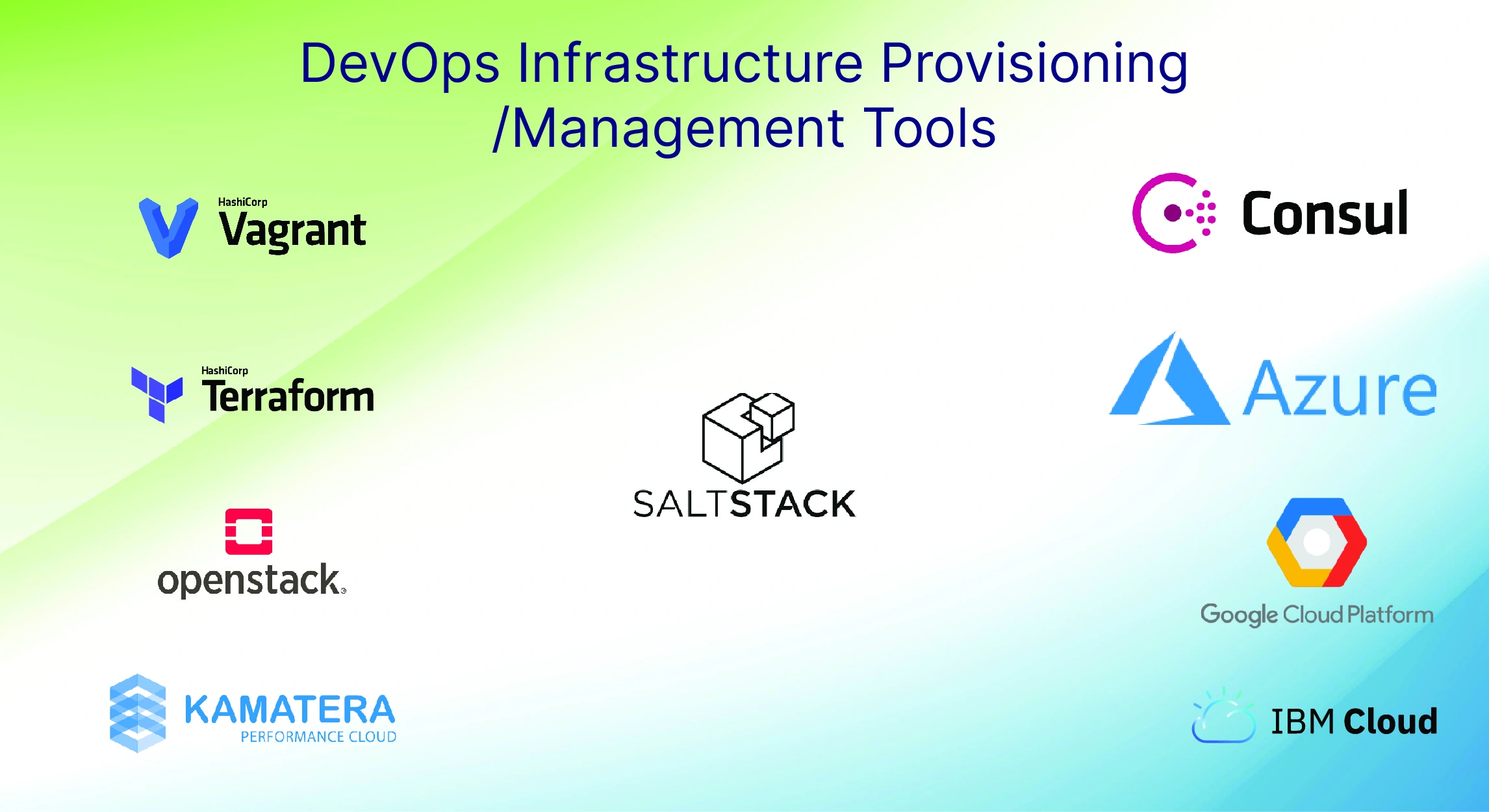
19. Vagrant
Vagrant, a free and open-source DevOps tool, simplifies creating and managing virtual development environments. It builds and manages multiple virtual machine environments within a single workflow. Vagrant is highly popular among developers due to its ease of use and ability to streamline automation-focused workflows. By reducing development environment setup time and ensuring production parity, Vagrant enhances efficiency and productivity.
Features of Vagrant:
⭐ Supports major operating systems
⭐ Provides flexibility in choosing editors, browsers, debuggers, and IDEs
⭐ Integrates well with other configuration management tools
⭐ Licensed under MIT
⭐ Emphasizes automation
Ignite innovation and drive success with our cutting-edge DevOps solutions!
Collaborate with our team of experts and leverage the power of the best DevOps Containerization Services to unlock unparalleled growth opportunities for your business.
20. Consul
Consul, developed by HashiCorp, is a top-tier DevOps tool for configuration management. It automates network configurations, facilitates secure connections, and enables service discovery in runtime or cloud environments. Consul greatly benefits modern infrastructure and aids in efficient traffic management for applications.
Features of Consul:
⭐ Integration with Kubernetes
⭐ Service mesh deployment
⭐ Dynamic load balancing
⭐ Service security with MTLS encryption and intention-based policies
⭐ Real-time service detection and agent health monitoring
21. Terraform
Terraform, a robust Infrastructure as Code (IaC) DevOps tool, automates infrastructure management by enabling users to create, modify, and enhance infrastructure without manual provisioning or management. It supports various platforms, including AWS, Azure, Google Cloud, Kubernetes, and OpenStack. With Terraform, you can manage DNS records, monitor systems, and utilize custom providers. It offers a user-friendly interface, making it easy to start and use.
Features of Terraform:
⭐ Declarative language for infrastructure configuration
⭐ Multi-cloud support for provisioning resources across different providers
⭐ Easy planning and application of changes
⭐ Infrastructure state management and versioning
22. SaltStack
SaltStack, is a configuration management and orchestration tool that shares similarities with Ansible. Like Ansible, SaltStack follows an agentless architecture and provides powerful tools for workflow automation. It emphasizes idempotency, allowing the execution of SaltStack playbooks multiple times without causing unintended side effects.
Features of SaltStack:
⭐ Comprehensive web request tracing
⭐ Granular role-based access control
⭐ Flexible image management with a private registry
⭐ Centralized configuration management
⭐ Modular architecture with extensions and plug-ins
23. OpenStack
OpenStack Services, known as the rapidly growing cloud computing platform. It allows customers to assemble and customize components according to their specific requirements. With its virtual resources for computing, networking, storage, and image services, OpenStack delivers a scalable solution for all your cloud hosting needs.
Features of OpenStack:
⭐ Compute, networking, and storage for clouds
⭐ Scalability and flexibility for diverse workloads
⭐ Multi-tenant support for secure environments
⭐ API-driven architecture for automation and integration
24. Google Cloud Platform
Google Cloud Platform or GCP supports DevOps by presenting services required to develop, store, and deploy high-quality software in shorter cycles. Also, Google Cloud presents extensive technical expertise and comprehensive cloud services for computing, storage, and analytics, along with artificial intelligence, machine learning, and data analytics capabilities. The GCP features instances of up to 96 vCPUs and 624 GB RAM along with services, such as the cloud console, Google Computes engine, and the GCP deployment manager that supports the implementation of DevOps on the Google Cloud.
Features of Google Cloud Platform:
⭐ High-performance infrastructure
⭐ Hybrid cloud capabilities
⭐ Advanced analytics and machine learning tools
25. Azure
Azure is a cloud computing platform by Microsoft that provides Azure DevOps, an integrated set of services and tools for managing software projects throughout the entire development lifecycle, from planning to testing and deployment. Azure DevOps follows a client/server model to deliver these services efficiently.
Features of Azure DevOps:
⭐ Diverse cloud services (compute, storage, AI)
⭐ Scalable infrastructure with global availability
⭐ Hybrid cloud capabilities
⭐ Robust security and compliance features
26. IBM Cloud
IBM Cloud delivers enterprise-grade cloud infrastructure and services. With the IBM Cloud platform, you can experience an integrated DevOps environment for all your applications. IBM Cloud DevOps insights utilize extensive data analysis to offer valuable insights to executives, managers, and developers.
Features of IBM Cloud:
⭐ Secure and scalable infrastructure
⭐ Diverse cloud services, including AI and analytics
⭐ Seamless integration with on-premises and hybrid cloud environments
⭐ Advanced security and compliance feature
27. Kamatera
Kamatera is a trusted cloud application deployment tool known for swiftly extending applications across multiple platforms globally. When choosing a cloud provider, consider the seamless application deployment Kamatera offers.
Features of Kamatera:
⭐ Global cloud data centers for high availability and low latency
⭐ Scalable virtual machines and cloud resources to meet changing demands
⭐ Cost-efficient and flexible pay-as-you-go pricing
⭐ Comprehensive management and monitoring tools for optimal performance
DevOps Test Automation Tools
DevOps automation is a technology that minimizes human involvement in task completion, enabling feedback loops between operations and development teams. This facilitates faster deployment of iterative updates to application productions.
28. Selenium
Selenium, a widely-used test automation framework for web applications, supports writing tests in multiple programming languages and offers cross-browser compatibility testing. It benefits from a vibrant community that contributes to its ecosystem.
Features of Selenium:
⭐ Multiple programming languages support
⭐ Extensive community support
⭐ Cross-browser compatibility testing
⭐ Seamless integration with various testing frameworks
29. Tricentis Tosca
Tricentis Tosca is one of the popular DevOps testing tools that employs a model-based approach to streamline end-to-end testing. With its visual modeling capabilities, it simplifies the testing process. Additionally, it offers test data management, integrations with widely-used frameworks, and support for a diverse range of technologies.
Features of Tricentis Tosca:
⭐ End-to-end testing capabilities
⭐ Test data management and provisioning
⭐ Model-based test automation
⭐ Integrations with popular tools and frameworks
30. TestSigma
TestSigma is an AI-powered test automation platform that eliminates the need for coding by automating the test creation process. It features intuitive test case generation, comprehensive reporting, and analytics and supports web and mobile applications.
Features of TestSigma:
⭐ AI-powered test generation
⭐ Test case reuse and modularization
⭐ Codeless test automation
⭐ Comprehensive reporting and analytics
31. IBM Rational Functional Tester
IBM Rational Functional Tester is a robust and versatile UI and functional testing tool. Performing a good functional testing needs not only a good tool but equivalent skills also. The comprehensive technology support it offers along with, multi-language scripting capabilities, and seamless integration with other IBM Rational products enable your team to conduct thorough and efficient testing across diverse applications.
Features of IBM Rational Functional Tester:
⭐ UI and functional testing for web and desktop apps
⭐ Multi-language scripting
⭐ Integrated test management and reporting
⭐ Cross-platform and technology support
32. SoapUI
SoapUI is an API testing DevOps tool that tests REST and SOAP APIs. It provides a user-friendly interface for creating and executing automated tests, making validating API functionalities easy and ensuring proper functioning. SoapUI supports data-driven testing that enables you to test API endpoints with different input data efficiently.
Features of SoapUI:
⭐ API testing and simulation
⭐ Assertions and validations
⭐ Service simulation (mocking)
⭐ Automation with Groovy
⭐ Data-driven testing capabilities
⭐ Integration with popular APIs and frameworks
33. Zephyr Squad
Zephyr Squad is a test management DevOps tool that streamlines test planning, execution, and tracking. Seamless integration with popular issue-tracking systems ensures comprehensive test coverage and traceability. Zephyr also offers customizable dashboards and reports for effective test management and reporting.
Features of Zephyr:
⭐ Seamless Jira integration
⭐ Agile readiness
⭐ Quick understanding of QA metrics
⭐ Synchronization of test management and automation
⭐ Leveling up automation with SmartBear
DevOps Monitoring Tools
DevOps monitoring tools empower teams to proactively and automatically address customer experience issues. They promote a “shift left” approach, detecting and resolving issues early in the development cycle to minimize production failures. Below is the list of the top monitoring tools in DevOps for optimal results within your organization:
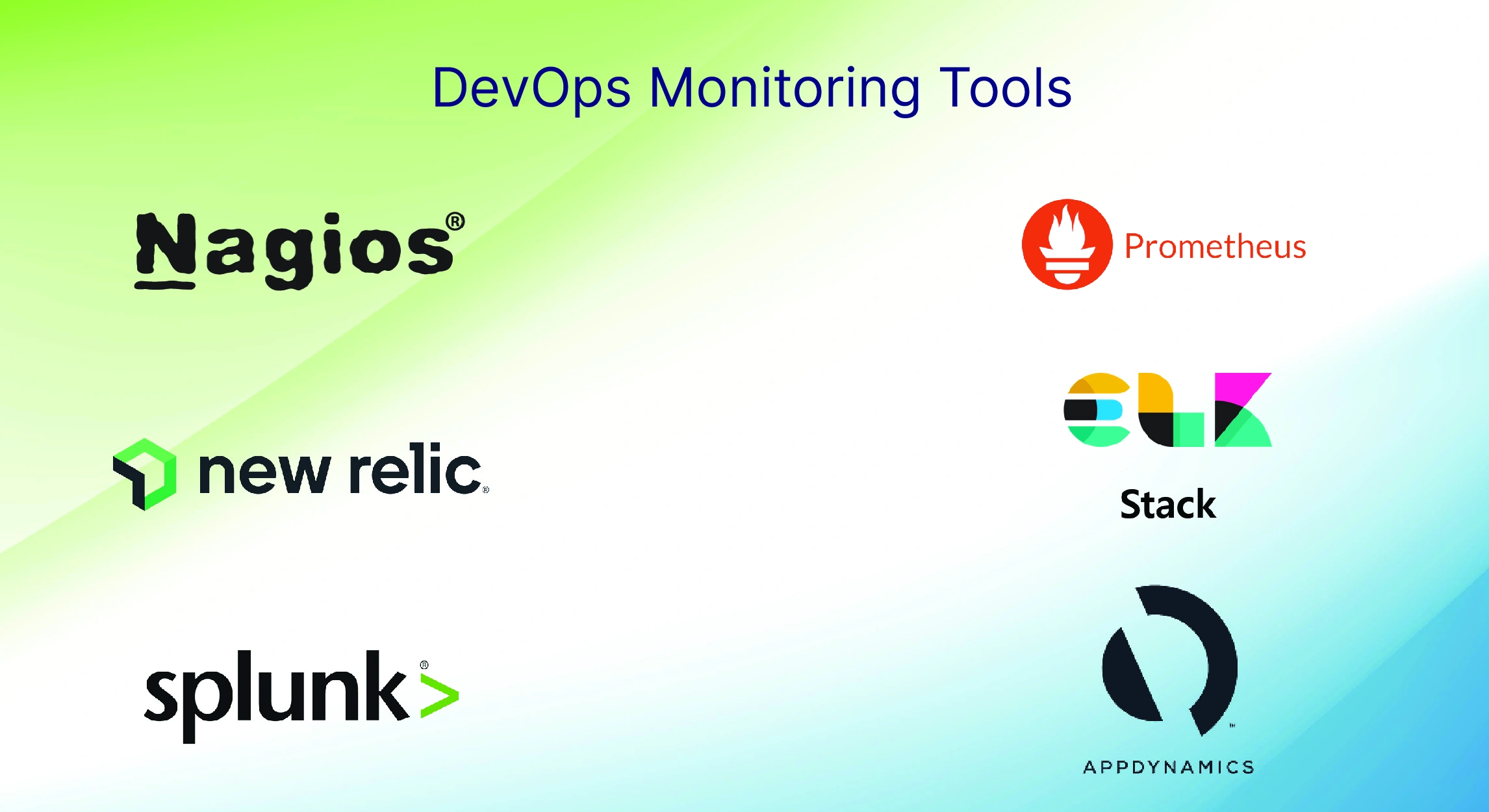
34. Nagios
Nagios, the widely-used open-source monitoring tool in DevOps, excels at providing real-time monitoring and alerting for networks, infrastructure, and services. Its flexible plugin architecture makes customization a breeze and offers robust performance and capacity planning support. Nagios is aptly efficient in keeping your systems in check and ensuring optimal performance and reliability.
Features of Nagios:
⭐ Comprehensive monitoring
⭐ Efficient problem remediation
⭐ Proactive planning and reporting
⭐ Multi-tenant capabilities
⭐ Extendable architecture
35. Prometheus
Prometheus, a robust monitoring DevOps tool, stands out for its ability to collect metrics and send alerts. It is specifically designed to handle dynamic environments, offering a multi-dimensional data model and a flexible query language (PromQL) for efficient querying and analysis of metrics.
Features of Prometheus:
⭐ Intermediary gateway support
⭐ Static configuration or service discovery
⭐ Multi-dimensional data model
⭐ Various graphing and dashboarding methods
⭐ Pull model over HTTP
36. New Relic
New Relic is another DevOps application performance monitoring or APM tool. It offers end-to-end visibility into web applications, mobile apps, and infrastructure performance. It offers real-time analytics, distributed tracing, and error analysis and helps organizations efficiently identify and resolve performance issues.
Features of New Relic:
⭐ Application performance monitoring (APM)
⭐ Real-time analytics and troubleshooting
⭐ Distributed tracing and error analysis
⭐ Access to performance data API
⭐ Transaction metrics and traces
37. Splunk
Splunk is a cutting-edge log management and analysis platform. It enables real-time collection, indexing, and analysis of machine-generated data. It also has powerful search capabilities, robust data visualization options, and support for large-scale data analytics; Splunk empowers organizations to gain valuable insights from their data.
Features of Splunk:
⭐ Log management and analysis
⭐ Real-time visibility into machine data
⭐ Powerful search and reporting
⭐ Large-scale data analytics and correlation support
38. ELK Stack (Elasticsearch, Logstash, Kibana)
The ELK Stack is a popular open-source stack that combines powerful tools for log management, centralized logging, and data visualization. With Elasticsearch, Logstash, and Kibana, you can efficiently store, process, and analyze your log data.
Features of ELK Stack:
⭐ Scalable and distributed search and analytics with Elasticsearch
⭐ Flexible data ingestion and processing with Logstash
⭐ Data visualization and exploration with Kibana
39. AppDynamics
AppDynamics is an APM tool that provides holistic monitoring and deep insights into application performance and user experience. It offers automatic baselining, real-time business transaction monitoring, and seamless integration with various platforms and frameworks.
Features of AppDynamics:
⭐ Real-time performance monitoring with intelligent analytics
⭐ User-friendly interface
⭐ End-to-end visibility
⭐ Automatic baselining and anomaly detection
⭐ Business transaction monitoring
DevOps Incident Management Tools
DevOps incident management is how IT Operations and DevOps teams respond to unplanned events that can disrupt service quality and operations. It focuses on quickly identifying and resolving issues while minimizing the impact on your business. Here are some top DevOps tools for incident management that can enhance your DevOps practices:
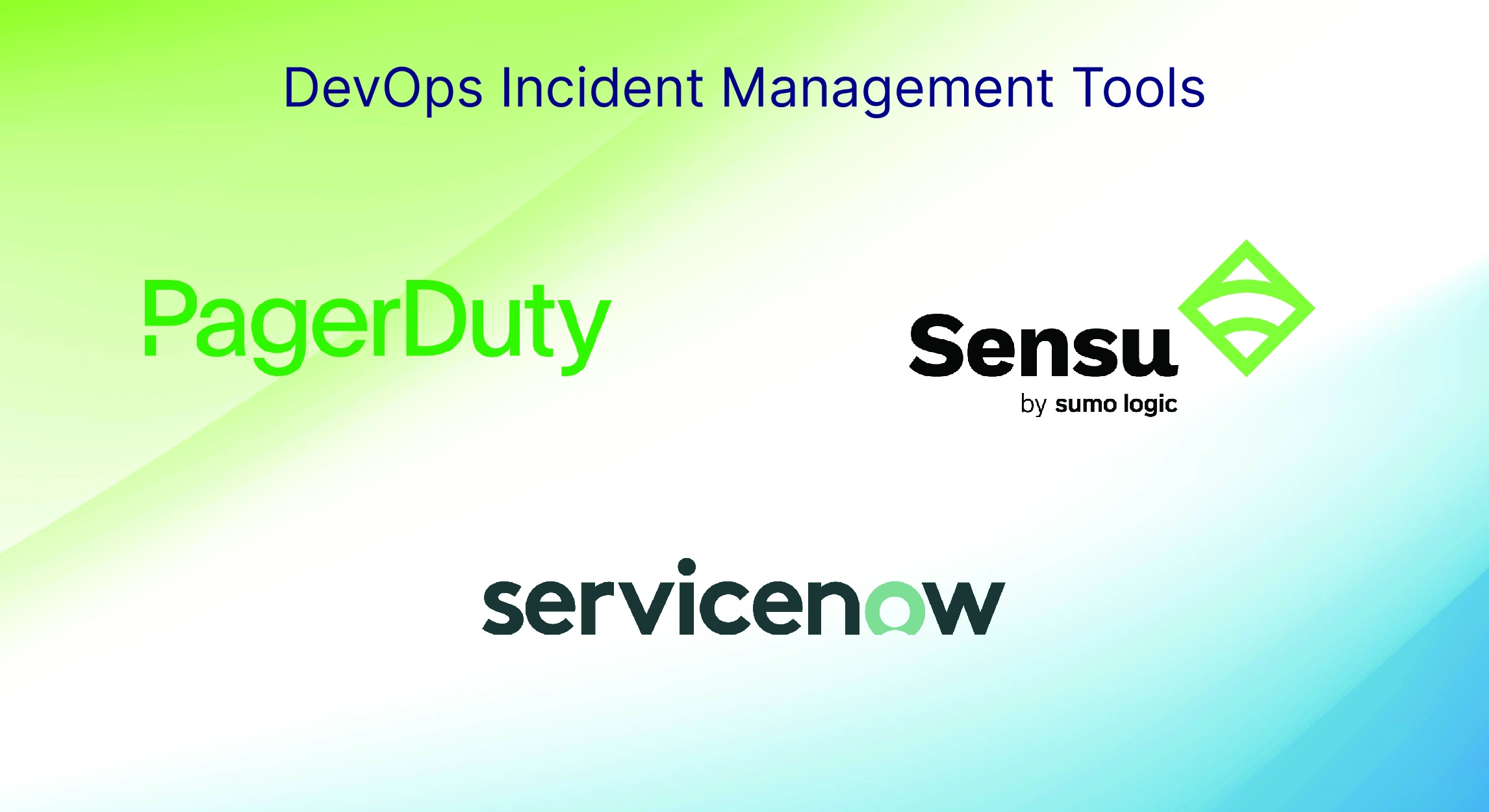
40. PagerDuty
PagerDuty is an all-inclusive incident management platform that enables organizations to centralize and effectively manage incidents. It offers an array of features, including alerting, on-call scheduling, escalation policies, and automation capabilities; also, it streamlines the entire incident response process.
Features of PagerDuty:
⭐ On-call scheduling and escalation
⭐ Integration with monitoring and communication tools
⭐ Incident response orchestration and automation
⭐ Centralized incident management and alerting
41. Sensu
Sensu is a revolutionary monitoring and incident response tool. With real-time incident detection and advanced anomaly detection, it ensures operational reliability. Integrated with dynamic infrastructure monitoring, Sensu empowers organizations to respond to incidents swiftly and deliver exceptional user experiences.
Features of Sensu:
⭐ Multi-cloud monitoring and event automation
⭐ Anomaly detection and alerting
⭐ Integrations with widespread monitoring tools
⭐ Dynamic infrastructure monitoring and scaling
42. ServiceNow
ServiceNow is another industry-leading IT service management (ITSM) platform that excels in incident, problem, and change management. Its comprehensive capabilities offer a centralized system for effectively managing and resolving incidents, automating workflows, and accurately tracking service requests.
Features of ServiceNow:
⭐ Instance-based implementation
⭐ Easy asset tracking
⭐ Controlled approval process
⭐ Real-time analysis visualization
⭐ Data confidentiality and integrity with ServiceNow security
DevOps Collaboration/Communication Tools
DevOps collaboration and communication tools facilitate the seamless sharing and exchange of data and technical information among security, development, business, and operations teams. Below given are a few top DevOps collaboration tools to consider based on your specific needs and requirements:
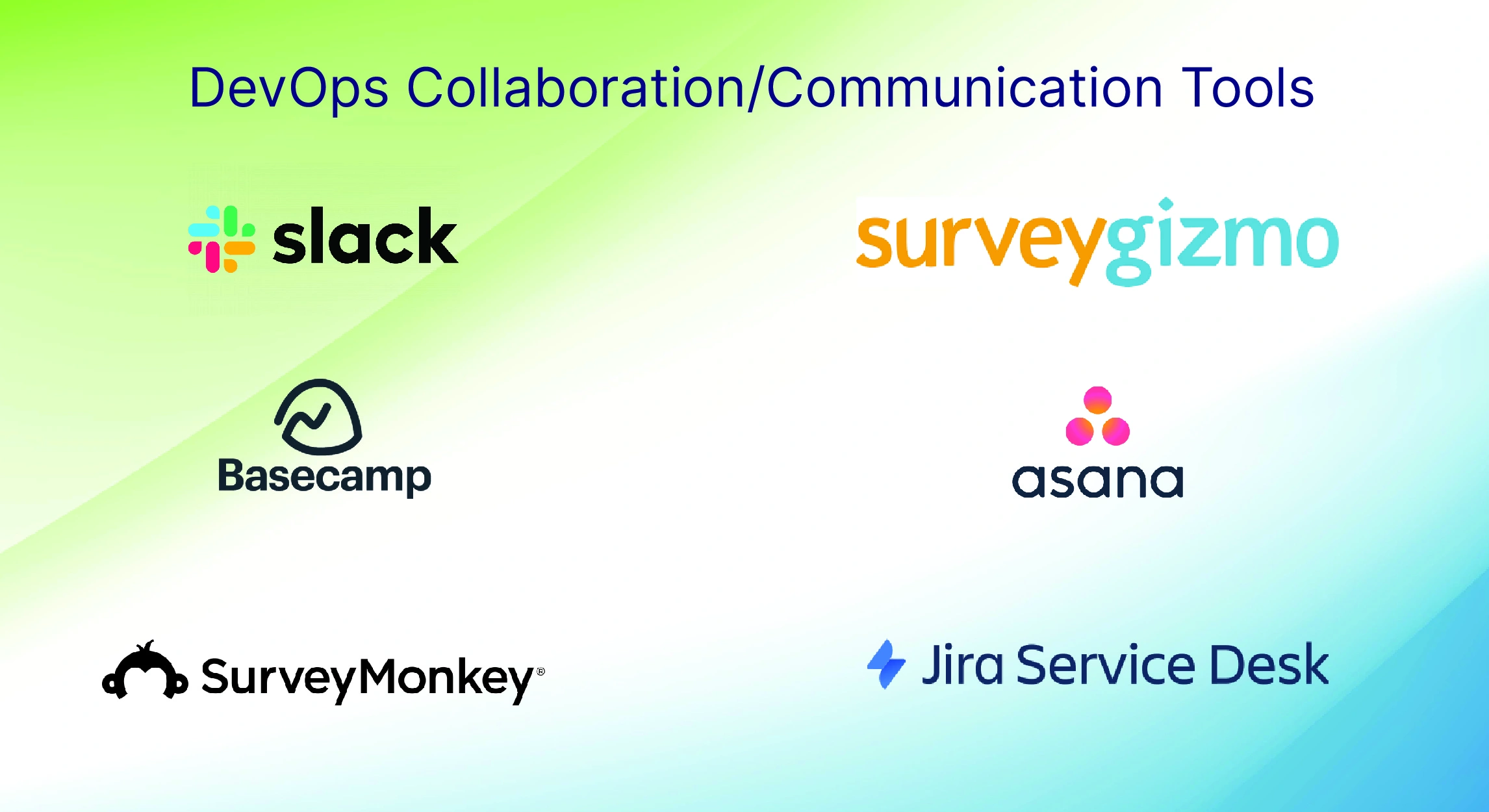
43. Slack
Slack stands out as a top-rated and indispensable team collaboration tool. It is renowned for its real-time messaging, seamless file sharing, and extensive integrations with various tools and services. Slack empowers teams to collaborate effectively as a centralized communication hub, ensuring efficient information sharing and fostering a cohesive work environment.
Features of Slack:
⭐ Team collaboration and communication
⭐ Real-time messaging and file sharing
⭐ Global-scale support and integrations
⭐ Channel-based organization for efficient collaboration
44. Jira Service Desk
Jira Service Desk is a comprehensive service management software that optimizes and helps streamline IT service operations. It offers many features and functionalities to deliver exceptional customer support. It possesses efficient ticket management, incident tracking, and problem resolution capabilities. Its user-friendly interface, customizable workflows, and automation features enhance collaboration, reduce response times, and boost customer satisfaction. Also, Jira Service Desk offers robust reporting and analytics tools to monitor performance and identify areas for improvement.
Features of Jira Service Desk:
⭐ Incident, problem, and change management
⭐ Self-service portal for end-user support
⭐ Automation and SLA tracking
⭐ ITSM and ticketing system
45. SurveyMonkey
SurveyMonkey is a trusted and widely-used online survey platform streamlining survey creation, distribution, and analysis. It offers customizable templates, advanced reporting capabilities, and seamless integration options that allow users to gather valuable insights effectively and make informed decisions.
Features of SurveyMonkey:
⭐ Collect information and feedback from anywhere
⭐ Analyze responses and scale accordingly
⭐ Advanced dashboards and inbuilt reports
⭐ Customizable survey templates and questionnaires
46. SurveyGizmo
SurveyGizmo is a powerful, dynamic survey tool with advanced question types, intelligent logic, and seamless CRM integration. With robust data security measures, it ensures the confidentiality of your valuable insights. It offers comprehensive survey management, data analysis, enhanced data security, and more for you to make the most informed and calculated decisions.
Features of SurveyGizmo:
⭐ Embeddable survey option
⭐ Email marketing and skip logic
⭐ Offline response collection
⭐ Data analysis tools and reporting features
47. Basecamp
Basecamp is a project management and team collaboration DevOps tool for communication and collaboration that helps you organize tasks, track progress, and communicate effectively with your team and other teams. It has out-of-the-box functionalities like task assignment, file sharing, and milestone tracking, which offer seamless coordination and enhance productivity for successful project outcomes.
Features of Basecamp:
⭐ One-page dashboard for everything
⭐ A centralized place for discussion
⭐ Robust task tracking and assignment
⭐ Realtime group chat option
48. Asana
Asana is a popular DevOps tool offering comprehensive features better to align work planning, organization, and tracking. With its intuitive interface, collaboration tools, and customizable Kanban boards, it helps enhance efficiency and deliver projects on time with exceptional results. It also offers seamless integrations with popular productivity tools further enhance efficiency, making it the ultimate choice for effective project management and improved productivity.
Features of Asana:
⭐ Unlimited project and task creation
⭐ Team collaboration and communication
⭐ Kanban boards and timeline views
⭐ Integration with several productivity tools and services
Conclusion
These were the top tools for DevOps that we have brought to you. However, DevOps is a rapidly growing field, and many prominent tools are available to help you automate your workflows and improve delivery efficiency. These tools are just a chunk from a considerable lot of great options. You can choose from these best DevOps tools, the most viable ones based on your needs and requirements, and the best tool for your organization will depend on your specific needs and requirements. However, if you are a business owner and need to figure out how your DevOps journey would go, partner with experts like Bacancy in DevOps to get the most effective results in record time and effort.
Frequently Asked Questions (FAQs)
DevOps offers several benefits for organizations: enhanced scalability and availability, improved visibility into system outcomes, greater innovation potential, optimized resource utilization, quick issue resolution, simplified processes, stable operating environments, efficient product delivery, and increased automation.
DevOps practices are the core idea of continuous improvement and automation. Many practices focus on one or more development cycle phases. These practices include Continuous Development, Continuous Testing, Continuous Integration (CI), Continuous Delivery, Continuous Deployment (CD), Continuous Monitoring, and Continuous Feedback. However, these DevOps practices can vary depending on the project and the organization’s needs.
DevOps practitioners often utilize a collection of tools called the DevOps toolchain to streamline and automate various stages of the software delivery process. These tools promote automation, collaboration, and integration between development and operations teams and aim to make the workflow more efficient and shorter.
Your Success Is Guaranteed !
We accelerate the release of digital product and guaranteed their success
We Use Slack, Jira & GitHub for Accurate Deployment and Effective Communication.








